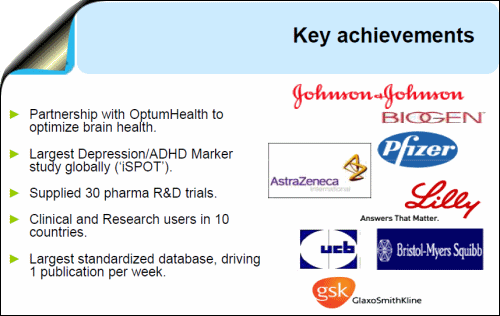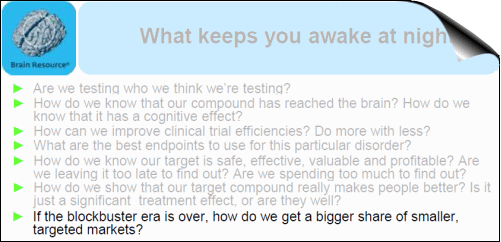- personalized medicine: the preface…
- personalized medicine: the concept…
- personalized medicine: BRAINnet…
- personalized medicine: the Brain Resources company I…
- personalized medicine: the Brain Resources company II…
- personalized medicine: mid-course rest stop…
- personalized medicine: a preventive medicine polemic…
- personalized medicine: beyond blockbusters…
- personalized medicine: the shoals of fuzzy math…
- personalized medicine: and along the hudson…
- personalized medicine: paradoxes…
- personalized medicine: a conclusion in search of an argument…
- personalized medicine: apocalypse
nowsoon… - personalized medicine: prequel to an epilogue…
- the race for biomarkers…
- Godzilla vs. Ghidorah [the Three Headed Monster from Outer Space]…
The term "personalized medicine" comes from the efforts in oncology to identify biomarkers in tumors that predict response to chemotherapeutic agents – an effort in oncology that has lead to remarkable success. Members of the fraternity of pseudoscientists have imported it into psychiatry in a particular way. In psychiatry, we have long been aware that some of the diseases we treat actually do have a genetic or biological substrate – ADHD, Schizophrenia, Manic-Depressive Illness, Melancholia. While some think all psychiatric illness is biologic, even the rest of us agree it’s true in some conditions. We’ve longed for some kind of biomarkers that would prove that association – but the efforts to find them have so far met with only limited success. So bringing modern technologies to bear on that problem makes sense. But the efforts of the people currently looking into personalized medicine aren’t following that path. They’re looking for biomarkers that predict responses to treatment [personalized medicine: the concept…]. Like I said, "Almost all of their research is ultimately oriented towards promoting some marketable product – usually drugs."
International Study to Predict Optimized Treatment for Depression (iSPOT-D), a randomized clinical trial: rationale and protocol.
by Williams LM, Rush AJ, Koslow SH, Wisniewski SR, Cooper NJ, Nemeroff CB, Schatzberg AF, Gordon E.
Trials. 2011 Jan 5;12:4.
AbstractBACKGROUND: Clinically useful treatment moderators of Major Depressive Disorder (MDD) have not yet been identified, though some baseline predictors of treatment outcome have been proposed. The aim of iSPOT-D is to identify pretreatment measures that predict or moderate MDD treatment response or remission to escitalopram, sertraline or venlafaxine; and develop a model that incorporates multiple predictors and moderators.METHODS/DESIGN: The International Study to Predict Optimized Treatment – in Depression (iSPOT-D) is a multi-centre, international, randomized, prospective, open-label trial. It is enrolling 2016 MDD outpatients (ages 18-65) from primary or specialty care practices (672 per treatment arm; 672 age-, sex- and education-matched healthy controls). Study-eligible patients are antidepressant medication (ADM) naïve or willing to undergo a one-week wash-out of any non-protocol ADM, and cannot have had an inadequate response to protocol ADM. Baseline assessments include symptoms; distress; daily function; cognitive performance; electroencephalogram and event-related potentials; heart rate and genetic measures. A subset of these baseline assessments are repeated after eight weeks of treatment. Outcomes include the 17-item Hamilton Rating Scale for Depression (primary) and self-reported depressive symptoms, social functioning, quality of life, emotional regulation, and side-effect burden (secondary). Participants may then enter a naturalistic telephone follow-up at weeks 12, 16, 24 and 52. The first half of the sample will be used to identify potential predictors and moderators, and the second half to replicate and confirm.DISCUSSION: First enrolment was in December 2008, and is ongoing. iSPOT-D evaluates clinical and biological predictors of treatment response in the largest known sample of MDD collected worldwide.
I’ve highlighted some familiar names in blue. This effort is financed largely by pharmaceutical companies [adapted from the Brain Resources web site]:

There’s another effort funded by the NIMH, Madhukar Trivedi Principle Investigator:
| Project Number: | 1U01MH092221-01 | Contact Principal Investigator: | TRIVEDI, MADHUKAR H |
| Title: | ESTABLISHING MODERATORS/BIOSIGNATURES OF ANTIDEPRESSANT RESPONSE- CLINICAL CARE | Awardee Organization: | UNIVERSITY OF TEXAS SW MED CTR/DALLAS |
| Abstract Text: | |||
| DESCRIPTION (provided by applicant): The timely selection of the best treatment for patients with depression is critical to the goal of improving remission rates. Due to the biological heterogeneity and variable symptom presentation of depression, it is unlikely that a single clinical or biological marker can guide treatment selection. Rather, a biosignature developed from a systematic exploration of a group of clinical and biological markers is more likely to be successful. Two types of biosignatures are needed to achieve improved outcomes: 1) biosignatures to maximize the selection of optimal treatment for individual patients at the beginning of treatment (moderators) and 2) biosignatures to identify indicators of eventual outcomes early in treatment (mediators). This approach has great potential to personalize treatment and maximize the number of patients who can be treated to full remission with a given treatment. We propose a comparative effectiveness trial of three mechanistically distinct treatments for MDD (citalopram, bupropion, and cognitive behavioral therapy) in which we will assess a comprehensive array of carefully selected clinical (i.e. anxious depression, early life trauma, & gender) and biological (i.e. genetic, neuroimaging, serum, epigenetic & qEEG) moderators and mediators of outcome. Using innovative statistical approaches the identified moderators and mediators will then be used to develop a differential depression treatment response index (DTRI). The proposed study is a randomized two-stage trial (Stagel:12 wks; Stage2: 12 wks) design with 675 MDD patients (with a history of one adequate trial of an SSRI except citalopram) assigned to one of three treatment conditions (n=225 each). This two stage approach is similar to a Sequential Multiple Assignment Randomized Trial (SMART) design. This application brings together researchers with extensive experience in conducting large clinical trials and experts at the forefront of the neurobiology of depression, including: clinical trials (Trivedi, Fava, Schatzberg, Nierenberg, Shelton, Gaynes, Hollon), genetics (Smoller, Binder, McMahan, Perils), neuroimaging (Phillips, Sheline, Etkin, Pizzagalli, Buckner), qEEG (losifescu, Ellenbogen), neurotrophins/cytokines (Duman, Sanacora, Turck, Shelton), clinical predictors (Shelton, Hollon, Trivedi, Fava, Nierenberg, Goodman, Yehuda), neuroendocrine markers (Holsboer, Schatzberg, Shelton, Yehuda), epigenetics (Nestler, Yehuda), and cognitive behavior therapy (Hollon, Manber, Arnow). This team will also be guided by internationally known biomarker scientists (Holsboer, Schatzberg, Krystal, Charney, Goodman), as well as a highly qualified group of biostatisticians (Kraemer, Wisniewski, Schoenfeld). PUBLIC HEALTH RELEVANCE : This study will examine multiple carefully selected clinical and biological markers, using both existing state of-the-art technologies as well as pioneering, innovative approaches. Evaluation of the usefulness of these markers in a trial with three different treatments will assist in generating a depression treatment response index (DTRI). The DTRI will help clinicians match treatments to patients with MDD, resulting in timely selection of treatments best suited for individual patients. Results from this study could significantly improve the treatment of patients with MDD. | |||
I don’t know all those people marked in blue, but there are certainly some very familiar fraternity of pseudoscientists candidates involved in this study too. There’s another commercial group in New York [personalized medicine: and along the hudson…] with some candidates on the Board.
Obviously, my point here is that these people are jumping on pop-science and aiming their study at a marketable product. But as long as I’m in the neighborhood, I might make some predictions. iSpot has the potential to produce some real junk science, but there is at least the possibility of finding biomarkers that might help us understand depression better – if not in predicting drug response, at least in comparing controls to depressed patients. The absence of a placebo group in the depressed cohort seems a flaw to me. Trivedi’s study is doomed. There are neither normal controls nor a placebo group. Worse, he’s only studying treatment failures to a previous trial of antidepressants. I expect it will be as useless as his previous outings: STAR*D, CO-MED, IMPACT, TMAP – more wasted NIMH money. His M.O. is to get a bunch of articles published before the results come in, only drop the ball when the results show nothing to muddy. How many doomed NIMH studies does he have to fail at before he comes off the payroll?

I’m not trying to pick a fight here, but what, pray tell, do you mean by a “biological substrate”?
Maybe not my best choice of terms. I meant something like underpinnings or causative factors. Like Melancholia which is not, to my knowledge, genetic, but many think has some biological basis independent of any psychosocial factors. Remember that I’m one of those guys that thinks a lot of depression is related to the mind and life, not the brain.
J&J settles the Risperdal case. It’s just a cost of doing business as usual, as usual. Link to Bloomberg/NYT Wire at my name.